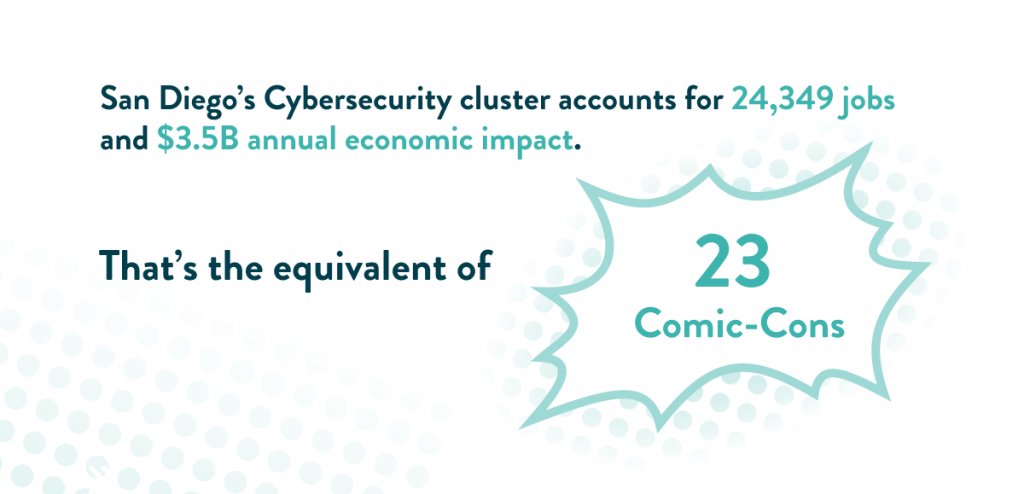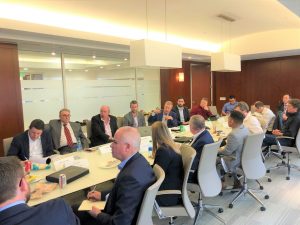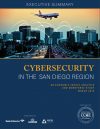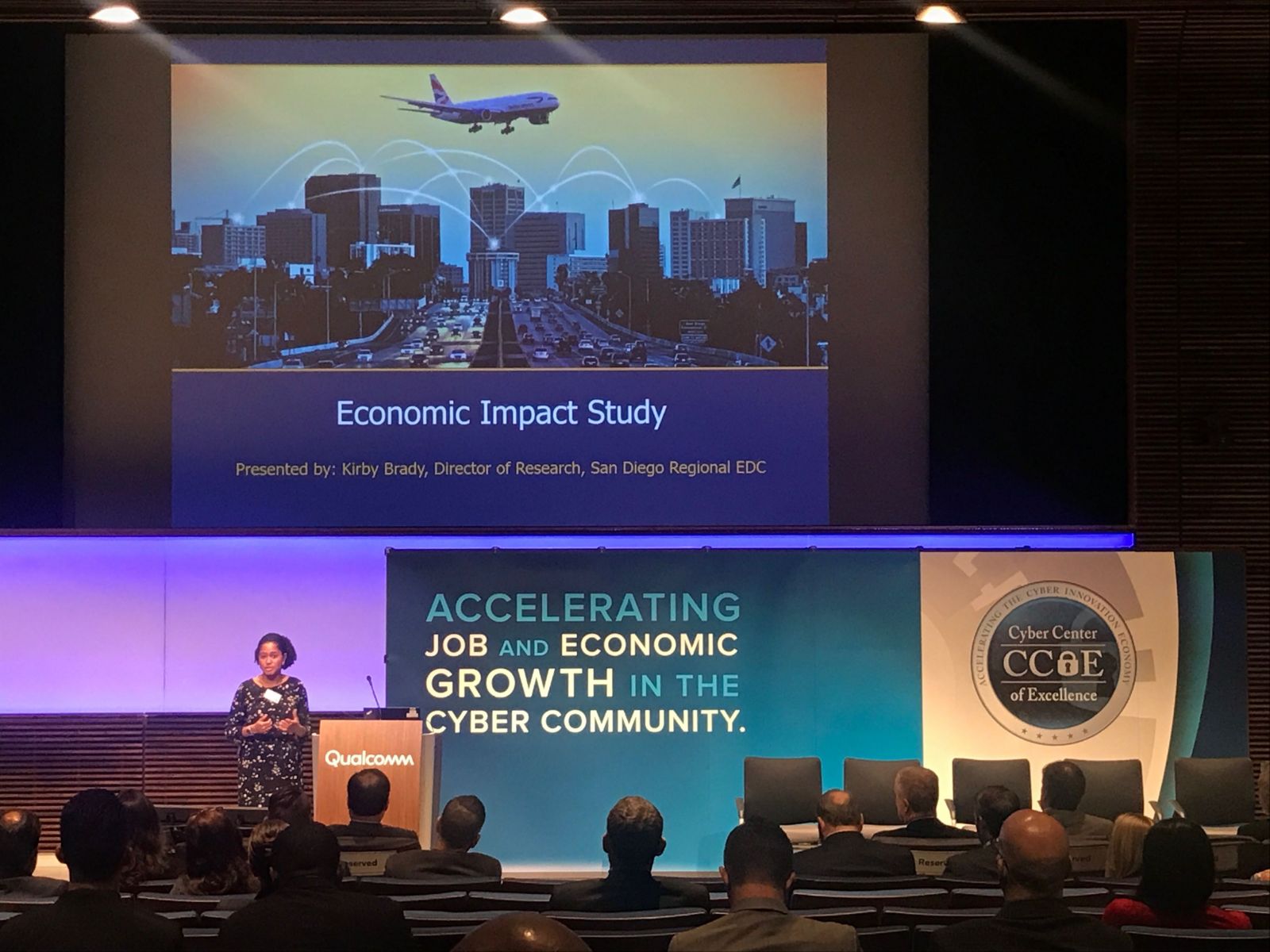EDC, CCOE study quantifies impact of region’s cybersecurity cluster
Together with the Cyber Center of Excellence (CCOE), EDC released “Cybersecurity is Everyone’s Business: San Diego’s Cyber Cluster.” The fifth update since 2014, the report quantifies the economic impact of the region’s cybersecurity cluster and explores the firms, technology, and talent working to help thwart cyber risk across San Diego and beyond.
As cyberattacks and ransomware threats extend beyond technology and begin to impact even our built environment, the importance of cybersecurity cannot be overstated. Not only are the consequences costly—reaching an average of $9.44 million in the U.S. per IBM—but they have profound impacts on human health and safety.
“San Diego is leading the charge with more than 1,000 cyber firms, top-ranked education and research institutes, and the Naval Information Warfare Systems Command (NAVWAR). This collaborative ‘Ecosystem in Action,’ as highlighted by the White House, is developing new technologies, solutions, and diverse cyber talent to create a more secure digital community for all,” said Lisa Easterly, President & CEO, CCOE—commissioning organization of the report.
Marking the 10-year anniversary of CCOE, the biennial report includes a deep dive into San Diego’s $4 billion cyber cluster, a metro-by-metro comparison, a roster of local resources and assets, and business sentiments of local firms.
KEY report FINDINGS
- Cybersecurity is everyone’s business. With increasing cyber threats to physical infrastructure, the security of data and communication is of critical importance, leading to a sharp rise in global demand for cybersecurity talent across industries. In San Diego, 59 percent of private sector cybersecurity jobs are in industries outside of technology, such as manufacturing, architecture, and engineering.
- San Diego’s cybersecurity cluster is expanding its footprint and impact on the regional economy. There are 13,383 jobs and 1,016 establishments tied to the cybersecurity cluster in San Diego, up eight percent and 17 percent respectively in the last two years. Altogether, this amounts to a $4 billion regional economic impact.
- Local cybersecurity firms remain deeply linked to the Federal government, including the Department of Defense. A majority (65 percent) of San Diego cyber firms work directly or indirectly with the government. Nearly one-fifth indicate government-related work as their primary focus, explaining why 23 percent of local cybersecurity firms are in the defense and aerospace industry.
- Fast growth and resilience define San Diego’s cybersecurity talent. The region’s talent pool has grown by nearly 10 percent since 2018, five times faster than all other occupations combined. The cybersecurity talent base experienced significantly smaller job losses during the pandemic and recovered both more strongly and more quickly than other occupations.
- Demand for cyber talent far exceeds local supply. Three out of four cybersecurity firms in San Diego report having difficulty finding entry- to mid-level as well as experienced applicants. Increasing compensation and diversity can help address San Diego’s talent shortage.
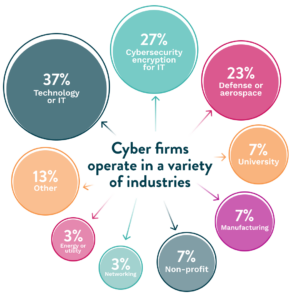
Cyber is an important and rapidly growing piece of the San Diego regional economy. The cluster supports 26,000 local jobs, most concentrated at NAVWAR, the preeminent provider of information warfare capabilities for the U.S. Navy. In all, the economic impact of San Diego’s cyber cluster is about the same as 24 Comic-Cons.
“Firms in every industry face cybersecurity risks. This is driving up the demand for cybersecurity talent and solutions. To keep pace and remain competitive, San Diego must leverage its unique assets, such as the military, as well as its incredibly diverse pool of talent,” said Eduardo Velasquez, Senior Director of Research and Economic Development, EDC.
“We have a national shortage of cyber workers—to the tune of 663,000 in the U.S. per Cyberseek. Opening the aperture with accessible and skills-based training helps seed and diversify the talent pipeline, which is critical to advancing our country’s homeland security,” said Joseph Oregon, Chief of Cybersecurity, Region 9, Cybersecurity and Infrastructure Security Agency (CISA).
More competitive compensation, increased diversity in recruitment, and thoughtful consideration of degree requirements are all strategies that can help San Diego lead in cybersecurity innovation across the region and globe.
In partnership with CCOE, the report was sponsored by Booz Allen Hamilton, CyberCatch, ESET, Haiku, RiskRecon, and San Diego State University, and was unveiled today at an industry event hosted at Qualcomm.
LEARN more about cyber IN SAN DIEGO
About Cyber Center of Excellence (CCOE)
CCOE is a San Diego-based nonprofit that mobilizes industry, academia, and government to grow the regional cyber economy and create a more secure digital community for all. sdccoe.org


